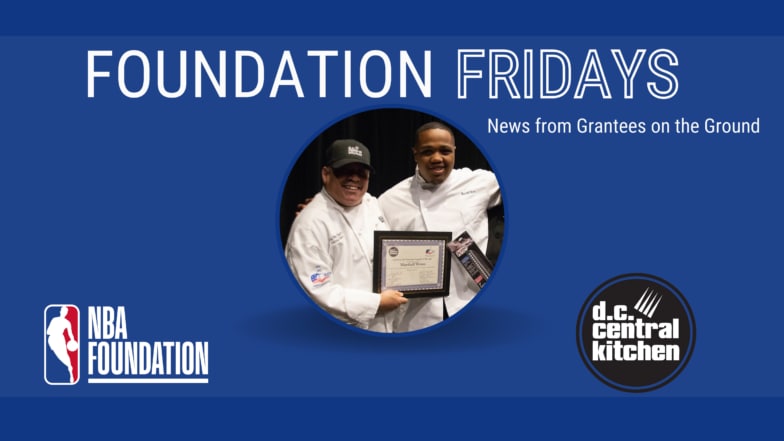
What is the DC Central Kitchen? Although that may seem like a simple question, the answer is complex.
Why?
Since 1989, DC Central Kitchen has addressed hunger and fought against poverty and provided job training and created employment opportunities.
Yes, DC Central Kitchen does all of that and so much more.
DC Central Kitchen was created by Robert Egger as a way of liberating people from poverty conditions. The nonprofit organization provides culinary job training and brings healthy food wherever it is needed, including to schools and corner stores in the DC area. It also operates quick service cafes featuring nutritious meals.
“We do workforce development, providing job training and career opportunities to members of our community who face barriers to employment,” said chief development officer Alex Moore. “The focus of our work with the NBA Foundation is working with young people ages 18-24 who faced barriers to employment. We also work with adults who experienced justice involvement, homelessness, addiction, and incarceration.
“The vast majority of our graduates work in hotels, restaurants and institutional cafeterias. We’re also our own best hiring partner. That’s what makes our training so special. Currently, 100 of our graduates work for us full-time. They are working as culinary instructors, on-site mentors, café managers and mentoring the next generation of students coming behind them. It makes for really cool, authentic, nurturing relationships.”
Culinary Job Training program graduates who work for DC Central Kitchen prepare over 10,000 meals per day for schools, shelters and non-profit programs across the city.
“Our training program is three months long and it’s full-time,” Moore said. “It’s a serious commitment that young people are making to this program. They meet us in a variety of ways. They may meet one of our recruiters at a community event. They may come to one of our facilities and ask for an application. They may visit one of our cafes. Our program is meant to not throw barriers in front of people who are looking for a culinary career. We are looking for people who are passionate about the industry and are demonstrating a level of readiness for the way our program works. It’s a mixture of knife skills and life skills. Students work in the kitchen practicing all those hands-on skills. They graduate with multiple industry-recognized certifications in the food service industry.”
Although you graduate from the program ready for a career in the culinary industry, DC Central Kitchen provides you with other skills to help you in life.
“A lot of what we’re working on is those professional skills,” Moore said. “Building that self-confidence up. Building that sense of self-presentation. Being able to articulate a clear pathway for yourself and how this program and the job you get out of it is going to help set you up long term. Our self-empowerment class is what students identify as what they are least excited about on Day 1 but is what is most transformational for them at the conclusion of the program. “
There have been over 2,000 graduates since the start of the program. With the help of the NBA Foundation, DC Central Kitchen was able to open a second job training café.
“After about nine weeks in the kitchen, our students do an internship at one of our social enterprises,” Moore said. “We talk them through mock interview practices, resume preparations, salary negotiations, what can you ask for and how do you make the most of that opportunity. After they graduate, we provide two years of support and follow up.”

Mykel T., a Culinary Job Training graduate, is a café lead at Marianne’s Café by DC Central Kitchen at the MLK Jr. Memorial Library in downtown D.C.
“The program put me in a position to know what to do physically in my job,” he said. “The cooking is one thing, but the customer service and the ability to communicate with different kinds of people is another factor. That’s something CJT focuses on, and I think these lessons are good learning tools.
“Self-empowerment made me look a little deeper into potential problems with my approach to both work and personal situations. It’s always good to pay attention to possible problems. We had a lot of conversations, but the main thing I took away is the value of hard work and consistency. It doesn’t matter where you come from or what you went through beforehand, as long as you stay consistent and work hard, you can achieve anything. You just have to have faith.”
For over 30 years, DC Central Kitchen operated mainly out of a basement space. This fall it is moving into a 36,000-square foot, state-of-the-art facility equipped with offices, kitchens and classrooms and will allow the program to reach more people.
“We are really excited and eager to get down to work in this new space,” Moore said. “As important as the work we’ve done at the old facility is, as transformative as the work our students have put forth in that facility has been, we know our students deserve better and can be even more ready for that next step in their careers. They will have modern, dignified spaces for training and learning. The fact our new facility will not only have a fully modern classroom for classroom-based learning but a fully state-of-the-art kitchen, a café right on site so students can be part of that full kitchen-to-table effort. They’ll be able to work on their skills in every one of those settings, working alongside alumni in our training program in our production kitchen. They will be working with volunteers and having all that under one roof where they can constantly be building skills and confidence is going to be transformative for our work.”
For more information on DC Central Kitchen, click here.









